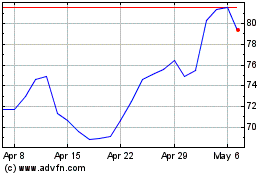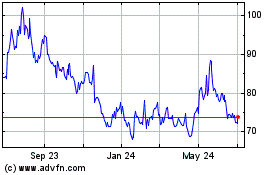By Steven Russolillo
This article is being republished as part of our daily
reproduction of WSJ.com articles that also appeared in the U.S.
print edition of The Wall Street Journal (March 29, 2018).
The clobbering that tech shares have taken in recent days has
magnified not only how influential these companies have become in
people's everyday lives, but how much sway they have gained in
global stock markets.
Investors are concerned that the tech giants have grown so much
and so fast in recent years that they now carry outsize weight.
Combined, the five largest U.S. technology and internet companies
account for more than 14% of the S&P 500 index's weighting.
Their rapid gains have come alongside heavy inflows into passive
funds that track indexes like the S&P 500, leaving millions of
investors susceptible to greater downside.
Tech shares came under more pressure Wednesday amid fears of
increased regulatory oversight. The NYSE FANG+ Index -- which
tracks 10 global tech heavyweights -- fell 2.4%, extending losses
after suffering its worst one-day drop on Tuesday.
Major U.S. indexes continued slumping as well in another
volatile session that saw the tech-heavy Nasdaq Composite slip 0.9%
and underperform the S&P 500 and Dow Jones Industrial Average,
which posted modest losses. The S&P 500 technology sector is
down 6% so far this month.
Amazon.com Inc. and Tesla Inc., both components of the NYSE
FANG+ Index, were among the weakest performers Wednesday. Amazon
fell 4.4% and closed in correction territory -- off more than 10%
from its March 12 high -- amid speculation that the White House
wants to clamp down on the e-commerce giant's growing
dominance.
White House press secretary Sarah Huckabee Sanders said on
Wednesday that President Donald Trump wants "a level playing field
"for all businesses but noted "there aren't any specific policies
on the table at this time."
Tesla, meanwhile, slumped 7.7%, extending its Tuesday's tumble,
amid an investigation into a fatal Tesla crash and following a
Moody's Investors Service rating downgrade on the electric auto
maker's debt. Selling in Tesla bonds also intensified, driving the
price of its unsecured debt to new lows.
Facebook Inc. has been the worst performer among the big tech
companies, falling 13% this year amid controversy over how it
handles users' data. Chief Executive Mark Zuckerberg expects to
testify before Congress about the company's privacy and data-use
standards, in what would be his first public testimony before
lawmakers.
Shares of Apple Inc. and Google parent Alphabet Inc. are also
down for the year, faltering in recent weeks on concerns that tech
firms face tighter regulation.
The declines illustrate a rapid shift in investor confidence in
the sector, which until recently had been a reliable generator of
big returns and a major driver of the market's run. It isn't yet
clear whether the selloff marks a permanent shift from tech stocks'
leadership of the market, or a temporary hit to the companies'
reputations.
Up until recently "these ... names have been as close as one can
get to a stabilizing force in the market," said Mike O'Rourke,
chief market strategist at U.S. brokerage firm JonesTrading.
Highflying companies including Microsoft Corp., Alphabet and
Facebook were among the most widely held last year by institutional
investors, such as pension funds and endowments, according to
eVestment data. Apple Inc. and Amazon, technically a consumer
stock, also cracked the top 10 in ownership breadth.
As of March 12, Facebook, Amazon, Apple, Microsoft and Alphabet
had accounted for 45% of the S&P 500's year-to-date gain, he
said, indicating just how central they have become to index
moves.
The overall tech sector now has a 27% weight in the S&P 500,
making it by far the largest component. Financial stocks, in second
place, account for 17%, according to Thomson Reuters.
"Due to Facebook's privacy scandal, the techlash theme has been
gaining momentum," Mr. O'Rourke said. "Since consumer privacy data
is the key competitive edge of these companies, it means the level
of risk and uncertainty has risen."
Plenty of investors remain confident tech companies can maintain
strong growth rates.
Nearly 90% of U.S. tech companies beat consensus revenue
estimates in the fourth quarter, noted Toni Sacconaghi, a tech
analyst at Sanford C. Bernstein. That is the best beat rate for any
sector and the highest for tech companies in the past five
years.
Expectations for tech spending growth for 2018 were the highest
in the 14-year history of a Bernstein survey of chief information
officers.
The tech sector's growing clout isn't just a U.S. story. Tech
stocks have become so dominant in emerging markets that for the
first time since 2004, the industry last year overtook finance as
the biggest sector in the MSCI Emerging Markets Index.
Tech had a 28% weighting near the end of 2017, more than double
its level six years ago, according to data provided by MSCI.
Samsung Electronics Co. carries a roughly one-fourth weighting
in South Korea's benchmark Kospi stock index. As the country's
biggest exporter, it has fallen 4.4% this year, largely due to
concerns about heightened global trade tensions.
Asia's most valuable company, Tencent Holdings Ltd., holds
nearly a 10% weighting in Hong Kong's Hang Seng Index. Its share
price is close to slipping into the red for the year after
disappointing earnings last week and news that an early shareholder
was selling a stake in the Chinese internet giant. A two-day
selloff last week wiped out $52 billion of the company's market
value.
Tencent had more than doubled last year, catapulting its market
value above $500 billion.
The company's sheer size has prompted caution among some
investors. Eric Moffett, a portfolio manager for T. Rowe Price in
Hong Kong, said his fund has owned shares since he started managing
it in 2014.
But the fund has sold some of it stake in Tencent for the past
six months due to valuation concerns, he said. He said shares,
trading at 40 times projected earnings, look "priced for
perfection" -- meaning investors expect flawless performance by the
company. This can prompt sharp pullbacks, like the selloff seen
last week.
--Ben Eisen contributed to this article.
Write to Steven Russolillo at steven.russolillo@wsj.com
(END) Dow Jones Newswires
March 29, 2018 02:47 ET (06:47 GMT)
Copyright (c) 2018 Dow Jones & Company, Inc.
Alibaba (NYSE:BABA)
Historical Stock Chart
From Mar 2024 to Apr 2024

Alibaba (NYSE:BABA)
Historical Stock Chart
From Apr 2023 to Apr 2024
